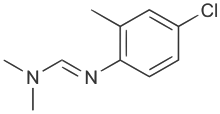Chlordimeform
Chlordimeform is an acaricide (pesticide) active mainly against motile forms of mites and ticks and against eggs and early instars of some Lepidoptera insects.[1] After the International Agency for Research on Cancer reported sufficient evidence that its major metabolite, 4-chloro-o-toluidine, was a carcinogen, its use has ceased and its registration has been withdrawn in most countries.[1]
 | |
| Names | |
|---|---|
| IUPAC name
N′-(4-chloro-2-methylphenyl)-N,N-dimethylmethanimidamide | |
| Other names
Chlorphenamidine; Chlorfenamidine; Fundal; Galecron | |
| Identifiers | |
CAS Number |
|
3D model (JSmol) |
|
| ChemSpider | |
| ECHA InfoCard | 100.025.637 |
| KEGG | |
PubChem CID |
|
| UNII | |
CompTox Dashboard (EPA) |
|
InChI
| |
SMILES
| |
| Properties | |
Chemical formula |
C10H13ClN2 |
| Molar mass | 196.68 g·mol−1 |
| Appearance | White crystalline solid |
| Melting point | 32 °C (90 °F; 305 K) (225-227 °C, hydrochloride) |
Solubility in water |
250 mg/L |
Except where otherwise noted, data are given for materials in their standard state (at 25 °C [77 °F], 100 kPa). | |
| Infobox references | |
References
- Chlordimeform, International Program on Chemical Safety, World Health Organization